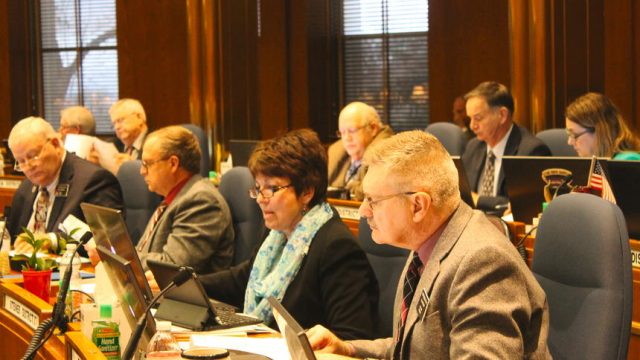North Dakota’s Legislature Needs to Meet Every Year

“Whether it’s relatively equal sessions each year or a flexible approach that other states used in transition doesn’t really matter. It’s time for the North Dakota Legislature to meet annually,” the Grand Forks Herald argues in an editorial today. “It’s time for the North Dakota Legislature to meet annually.”
The impetus for the Herald’s position is the recent special session during which state lawmakers had to meet to fix a budget hole created when post-oil boom revenues didn’t keep up with oil boom spending. Something had to give.
But I’m not sure the Herald’s argument is good enough. They are asking that we make a fundamental change to how our state is governed based on a situation that is inherently unusual. The oil boom, and all of its related public policy challenges, was a historically unusual situation. While North Dakota’s is certainly a commodity-based economy, impacted to no small degree by the vagaries of the various commodities markets, the oil boom was an outlier. Not, on its own, justification for changing how the state goes about its more routine business.
I do think, though, that the Legislature should meet every year, but my argument has more to do with truly promoting the idea that we have three separate but co-equal branches of government.
The executive and judicial branches of our state goverment are full-time affairs staffed by full-time public servants. The Legislature, on the other hand, is a part-time affair staffed by people who have day jobs. They meet every second years for no more than 80 days, a limit set out in the state constitution.
[mks_pullquote align=”right” width=”300″ size=”24″ bg_color=”#ffffff” txt_color=”#000000″]For no other reason than the practicalities of that time restraint, and the real-world realities of citizen legislators who are tasked with earning a living in addition to serving the state, too much policymaking has been delegated to the exectuvie branch.[/mks_pullquote]
For no other reason than the practicalities of that time restraint, and the real-world realities of citizen legislators who are tasked with earning a living in addition to serving the state, too much policymaking has been delegated to the exectuvie branch.
An example.
Back in July the North Dakota Industrial Commission passed a raft of new rules for the state’s oil and gas industry, among them a new requirement for a six inch berm around well sites to help contain spills there. Spills contained on the well pads (which are the vast majority of the spills which occur in our state despite the impression you might get from certain politicians and activist groups) have pretty much zero environmental impact because the pads are designed to handle them.
The new six inch berm rule – which was a twelve inch rule when it was first proposed – will impact some 4,000 well sites in the state. Which means millions and millions of dollars worth of compliance costs for the industry.
I’m agnostic as to the efficacy of this policy. On one hand, I really like the idea of making sure spills are contained at the well site. On the other hand, the industry argues that the berms don’t make sense at all well sites, and that berms designed to hold in oil and other drilling byproducts also hold in rain and snow melt creating ponds around wells that are difficult to deal with. Especially in winter when the water freezes.
So it’s not just the cost of creating the berms, but also constantly pumping out the well site so that it’s not a mud hole or, worse, an ice rink.
But my argument here isn’t about the process, not the policy. The North Dakota Industrial Commission was able to implement a major new regulatory burden on an industry with very little debate or oversight from legislators. You know, the people whose job it is to make the laws. The Legislature does have what’s called the Administrative Rules Committee which exercises oversight on this sort of regulatory policy making, but that committee doesn’t address the fact that the policymaking authority has been delegated to the executive branch in the first place.
At the federal level our nation has a terrible problem with executive branch agencies becoming legislative bodies unto themselves, making regulatory rules that have the force of law behind them with little to no input from elected leaders. Worse Congress, so often paralyzed by political in-fighting, has failed to push back against this usurptation of their lawmaking authority.
North Dakota does not have this problem. At least not to the degree that the federal government has this problem. But I worry that a part-time Legislature hampered by time restraints will continue to abdicate its authority to the executive branch.
Of course, a full-time Legislature or even a part-time Legislature which meets more often has its own challenges. Even formulated as it is now, serving in the Legislature is a major time commitment. It’s a lot of hard work. Meeting more often would mean more work and may convince some elected officials – particularly younger citizens who are lower on the income bracket – not to serve at all.
It would be a shame if our Legislature was only served by the elderly and the independently wealthy. There is quite enough of that sort of thing in the Legislature as it is.
I don’t know what the solution is, but I do know I’d like to see our Legislature be more assertive when it comes to governing the state. At the very least, that has to mean meeting every year.




